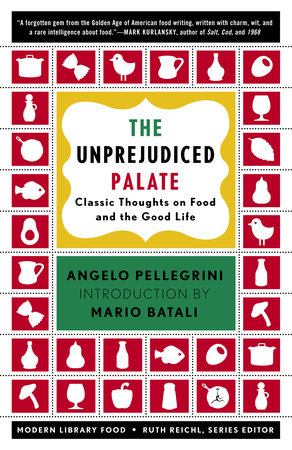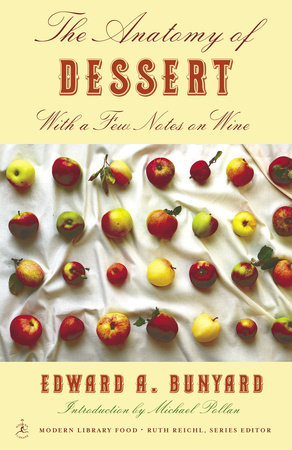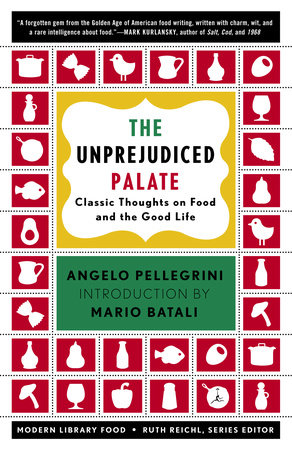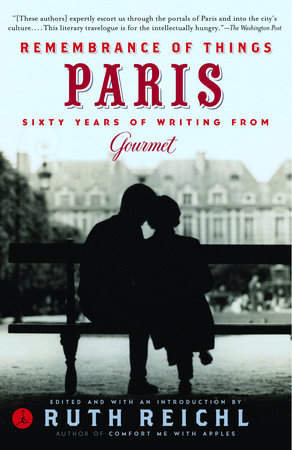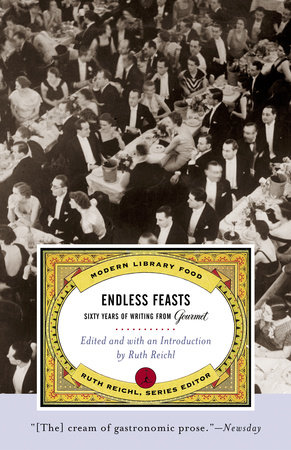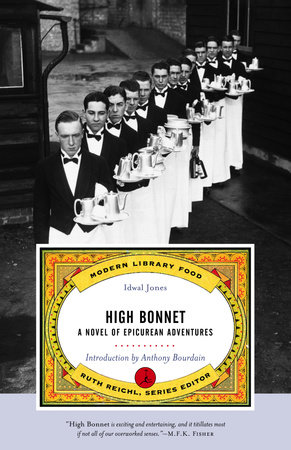Excerpt
The Unprejudiced Palate
“1
A SLIGHT TOUCH OF HERESY
WE HAD just won the game that gave us the Coast Conference championship in football. Bill’s parents had left that morning to spend the week end at their cottage on Puget Sound, and we were to have the house to ourselves. What an opportunity to stage a jolly undergraduate brawl! Would I prepare the dinner?
Why not? Had I any experience in cooking? No. Would I know how to proceed? Why, of course. All Italians can sing. All Italians can cook. All Italians can …
Bill was amazed at my confidence—and somewhat worried for we had invited, among others, a favorite professor of philosophy who was a practicing gourmet and of whom we were in considerable awe.
I had not, until then, undertaken anything more ambitious than frying an egg. And yet, I must confess my confidence was genuine. Without hesitation I proceeded with the shopping. My selection of a rabbit—mildly shocking to Bill and the girls—was an almost instinctive choice. At home, that animal had been more or less traditional fare for the Sunday dinner. Except for the artichokes, which occasioned some bewilderment, the other items on the menu were less uncommon and therefore more reassuring to my friends.
I said I had had no experience in cooking. Well, that is only a partial truth; for I had always lived in a delightfully culinary atmosphere and had served, so to speak, an unconscious apprenticeship in the kitchen. How often had I dressed a rabbit, or assisted Father with the task, on Saturday afternoon! How often had I gone to the garden, at Mother’s bidding, to get a sprig of thyme, a bit of rosemary, a little parsley, as she salted and peppered the rabbit and laved it in olive oil preparatory to roasting it! And ho! the number of times I had minced herbs under Mother’s occasionally impatient scrutiny!
Without actually being aware of it I had absorbed considerable culinary skill—had become something of a cook before I had attempted to cook anything at all. As I prepared the rabbit for the roaster, I remembered without effort a procedure that I must have unwittingly observed a thousand times. I rubbed the rabbit with garlic, salted and peppered it thoroughly, and stuffed the visceral cavity with a variety of herbs taken from the garden of an Italian acquaintance. I asked Bill for some olive oil—without success. But I had seen the article for sale in drug stores, so I asked to see the medicine cabinet. There it was, flanked by iodine and listerine! Bill told me his mother rubbed it on her scalp. He wasn’t quite sure.
I poured it into the roaster and on the rabbit. While the little animal was sizzling in the oven, I cleaned and halved the artichokes, a task I had reluctantly performed hundreds of times. I minced a little garlic and parsley which I worked into the artichokes after they had blanched for a few minutes. At the proper time I put them in the pan with the rabbit and basted them carefully with the oil, which by that time had been enriched with the meat juice.
Frankly, I do not remember whether the result even approached Mother’s roast rabbit. The occasion was extraordinarily gay, thanks to an excellent wine provided by an Italian friend. The procedure and menu were sufficiently unorthodox to disarm bright western undergraduates who were hell-bent on emancipation from all traces of provincialism. I also remember having pitched their expectations rather high with the announcement that the dish had been a favorite of the sumptuous Borgias, and that all Florentines—including myself—prepare it with enviable skill. (I have learned since that even a pretty fair gourmet can be conditioned to make the proper response.)
Well! the food must have been rather good than bad. The professor was eloquent in his expressions of praise and quite metaphysical in his analysis of the flavor. He used such words as “essence,” “synthesis,” “substance”; and unless my memory fails me, at one point in his verbal exuberance he used the word “universal” in referring to the rabbit. To an immigrant boy who was just learning his way around at the University, the professor’s performance was very impressive. What a pity that I had eaten roast rabbit so many times without enjoying its metaphysical subtleties! When dinner was over I was certain of one thing: the particular rabbit that I had prepared was consumed to the last morsel.
To that dinner, conceived in student gaiety and executed in utter innocence, may be traced a myth that, on occasion, has caused me considerable embarrassment. It was immediately bruited abroad that I was a chef of extraordinary resources, and that in the preparation of certain dishes I utilized the culinary secrets of the Borgias. Homes and apartments were placed at my disposal if only I would prepare a dinner for “a very select group.” During the ensuing year I repeated the rabbit dish—I didn’t dare attempt anything else!—forty or fifty times. Meanwhile I was trying desperately to live up to a reputation for which, I felt honestly, there was absolutely no foundation—except, possibly, a certain naïveté in my exceedingly enlightened friends. I systematized all the culinary knowledge that I had unconsciously absorbed as a reluctant apprentice in Mother’s kitchen. I pestered with questions whoever I had reason to believe knew something about cookery. In short, I settled down more or less seriously—mostly less—to expand my sphere of culinary achievements.
The amiable professor of philosophy became my most effective press agent. As the years went by we became intimate friends. I cooked for him frequently and made his wine. When he went to meetings of philosophical societies, from coast to coast, he boasted to his astute colleagues that a vintner’s son from the Chianti hills was in charge of his cellar. On at least one occasion he tucked the proof in his brief case and went across the continent to read a brilliant paper in defense of hedonism.
For reasons that will be discovered on the pages that follow, and implicit in the title to Part One of this book, I am suspicious of gourmets and connoisseurs, and so I resent being numbered among them. If someone suggests that I have “the artist’s touch” in cookery, I swear that I shall feed him pork and beans with tinned spaghetti for dessert.
But despite my protestations, the myth that I am a chef has persisted. For the past several years my good friends have urged me to establish a restaurant. The more enthusiastic among them have suggested that I write a cookbook. The idea of becoming a restaurateur is wholly repugnant. The suggestion that I write a cookbook presupposes that I am either a cook or—heaven forbid!—a slavish plagiarist of untried recipes and perpetuator of culinary nonsense.
I love good food—as who does not? I take some pride in the fact that in the realm of gastronomy an unprejudiced palate is my only guide. Where I can’t find food that pleases me, I fall to in the kitchen and prepare my own. Necessity has been the mother of what measure of invention and resourcefulness I possess in culinary matters. On occasion I produce something that smacks of real achievement. But I am not a cook. For example: I have never made an aspic salad, nor baked a pie.
However, the idea of writing a cookbook, after it had been suggested for a number of years, began to be somewhat alluring. Why not give it a try? An afternoon in my study, planning the chapters and writing out recipes, convinced me that the task would be unbearably dull. But perhaps I wasn’t going at it in the right manner. So I spent the next few days examining critically the more popular, chatty volumes on cookery. It was during that time that I conceived the idea for the pages that follow.


